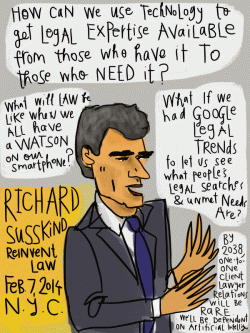Bloggers find inspiration at #ReInventLaw NYC--but admit some of it was nothing new

Last Friday at Cooper Union in New York City, nearly 40 lawyers gave presentations—many in a six-minute Ignite format—at ReInvent Law NYC. ReInvent Law conferences—the creation of Michigan State University College of Law professors Daniel Martin Katz and Renee Newman Knake— have been held in Dubai, Silicon Valley and London. And it’s no surprise that with a number of legal bloggers among the 800 or so attendees at the free event in New York, there was much post-event discussion. [Disclosure: The ABA Journal was a primary sponsor of the New York event.]
Ryan McClead of 3 Geeks and a Law Blog liked the rapid-fire format required to get so many speakers on stage in one day. “THIS is the way to give presentations; six-to-10-minute sessions,” he wrote. “All of the presenters I saw were great, but even if the topics didn’t interest me, I didn’t have to sneak out or grind my teeth through an hour of Windows 9 installation hurdles, I could just check my email for five minutes until the next topic was introduced.”
The Trademark Blog’s Marty Schwimmer was a speaker, and he wrote at his blog that after watching the morning presentations (his was in the afternoon) he realized “that my CLE-style presentation was out of place. Really out of place.” He made some adjustments.
Not only were the presentations very un-CLE, many of the speakers and attendees were actually not lawyers in private practice. And Simple Justice’s Scott Greenfield sensed some hostility toward practitioners. None of the speakers “disagreed that the law was in crisis, change was about to destroy life as we know it, and lawyers are greedy, selfish misanthropes who brought misery to society and destruction to themselves,” he wrote.
Many presenters “dismiss[ed] the legal profession (or trade, as FMC Technologies GC [Jeffrey] Carr explained, who stated that he couldn’t care less about hiring people engaged in the crime of the Unlawful Practice of Law) as stupid and venal because lawyers have yet to recognize the one true god, technology, that will make the world a wonderful place,” Greenfield wrote.
Schwimmer wrote that toward the end of his talk, he confessed that he had “a paranoid response to some of the lawyer-bashing that is inherent in a ‘Everything lawyers presently do is wrong’ conference. I felt like John Henry, picking a fight with a steam-powered hammer … I don’t actually believe the future demands such an either/or outcomes. I think that John Henrys learn to use steam-powered hammers. However those lawyers’ increased productivity reduces the overall number of (good) jobs for lawyers. The ones that keep their jobs will understand that there is this thing called ‘lawyering’ that cannot be automated (or automated well).”
Schwimmer was told after his speech that he dropped the mic (and was confused at first by the praise). But Robert Ambrogi’s Lawsites wrote that while some presentations were truly inspiring, “in all honesty, the speakers were a mixed bag. Some did little more than hawk their own products. Some presented Big New Thing ideas that, frankly, I’ve seen and heard before in my 20 years of covering this stuff.”

Image of Richard Susskind was among several sketchbook drawings posted by Margaret Hagan during and after ReInvent Law NYC.
My Shingle’s Carolyn Elefant, who has been blogging since 2002, also lamented that there wasn’t more new to say. “Reinvent Law concluded with Richard Susskind,” she wrote. “I hoped that Susskind would be the high point of an otherwise uneven day, but he depressed me even more (albeit unintentionally). Susskind trotted out screen shots of a program that he and a colleague built back in 1988, to address questions under a complicated regulatory statute. Yet here we are, 25 years later, and we’ve still scarcely advanced beyond that point. Meanwhile, as Susskind pointed out, large law firms have experienced unprecedented growth during that period, churning out billable hours to accomplish what a 1988 computer could do.”
But whether what the speakers had to say was old or new to you, if you were in the audience, you were probably a believer, McClead wrote at 3 Geeks. “The self-selected audience for an event like ReInvent Law already gets it. These are the people that are already changing the way law is done, or attempting to change their firms, or writing (or blogging) incessantly about the need to change the way we do things.”
Sarah Glassmeyer didn’t go into the conference sold on every idea that was to be presented. “One of the reasons I went to Reinvent Law NYC is because I think some of the ideas ARE bullshit, but I was open to having my opinion altered.”
The criticism she sees about ReInvent Law and the ideas presented there usually isn’t substantive, she writes. “Please, somebody … without using strawmen or misstatements of what people said or what a tool actually does, explain the problems with them. For example, why is predictive coding bad when attorneys everywhere have been relying upon Westlaw and other research tools algorithms to sort research results? Why is automating the instructions in local court rules so that a nonattorney can understand them and create a usable document so terrible? Why is it better for someone to go without a contract or enforceable agreement than one made by a cellphone app?”
Still, keep in mind that even good ideas don’t always succeed because they are for some reason not embraced by consumers, Rocket Matter’s Larry Port points out. “The DVORAK keyboard is much more efficient than the QWERTY one, but is only used by a small subpopulation. Betamax was of better quality than VHS but lost the war. Bolivian villagers refused to boil water even though it was less likely to make them sick.” Port praised Paul Lippe for discussing Everett Rogers’ book, Diffusion of Innovations in his presentation. “Innovation itself needs to be understood if new ideas are to take hold,” Port wrote. “Until the nature of diffusions of innovation is understood well by this community, adoption will be more miss than hit.”
Write a letter to the editor, share a story tip or update, or report an error.


